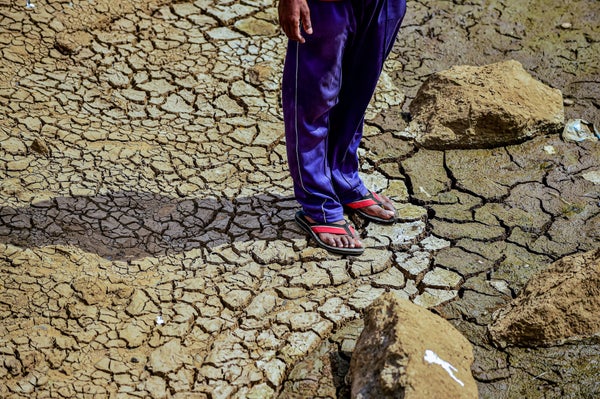CLIMATEWIRE | Climate change is undermining efforts to address hunger, health and other sustainable development targets — including the transition to clean energy, a U.N. report said Thursday.
The “United in Science” report, compiled by the World Meteorological Organization with input from 18 partner agencies, is issued annually ahead of the U.N. General Assembly session in New York. It provides an overview of the newest climate science, and this year it highlights the negative impact that rising temperatures are having on nearly all the United Nations’ Sustainable Development Goals.
It shows that emissions from fossil fuel burning rose 1 percent globally last year, despite the need for all emissions to fall by more than 40 percent by 2030 to limit warming to 1.5 degrees Celsius. That’s the more ambitious end of the Paris Agreement target, and scientists say every fraction of a degree higher will see increasingly dramatic and irreversible damage.
On supporting science journalism
If you're enjoying this article, consider supporting our award-winning journalism by subscribing. By purchasing a subscription you are helping to ensure the future of impactful stories about the discoveries and ideas shaping our world today.
Achieving those temperature goals will require “large-scale, rapid and systematic transformations,” the report stated. It estimated that current policies put the world on pace to warm by 2.8 C this century.
“Record temperatures are scorching the land and heating the sea, as extreme weather causes havoc around the globe,” U.N. Secretary-General António Guterres wrote in the forward to the report. He added that efforts to achieve the United Nations’ Sustainable Development Goals by 2030 are “woefully off track.”
The 17 goals are the U.N. blueprint for achieving global prosperity. They cover everything from clean water and sanitation to education to gender equality to climate action. But only 15 percent of them are on course, with a global economic downturn putting them further out of reach, according to the U.N. report.
It warned that extreme weather events could disrupt global food supplies, helping keep nearly 670 million people in the grip of hunger this decade. Heat waves and other climate-driven impacts are projected to lead to significantly more illness and premature deaths, while rising ocean heat further imperils food systems and resources many communities rely on for protection and employment.
Climate change also strains energy infrastructure and makes supply and demand less predictable. Heat waves, for example, can increase the need for air conditioning, putting pressure on fragile grids and complicating the transition to greener systems.
In the 50 years between 1970 and 2021, extreme climate events caused more than 2 million deaths and led to economic losses of $4.3 trillion, 60 percent of which occurred in developing countries, the report found.
“The impacts of these extreme events lead to losses of lives and livelihoods, exacerbate poverty and inequality, amplify food and water insecurity, trigger economic instability and, ultimately, undermine sustainable development,” it stated.
Thursday’s report also highlighted the role science and weather-related technology play in meeting development targets. Improved data collection and weather prediction can help boost food production or protect energy systems, it found. Impact-based forecasting and more robust early warning systems — one of the secretary-general’s key initiatives — can help limit the damages from climate-fueled disasters.
But far more investment is needed to bring those technologies to scale. Only half of countries report even having early warning systems in place, the report said.
A separate report published Wednesday outlined the ways that governments can address both development and climate change together, in large part through increased collaboration and investment.
“The vast pool of existing evidence underscores that the Paris goals and the [Sustainable Development Goals] are mutually re-enforcing and one cannot be achieved without the other,” it said.
Reprinted from E&E News with permission from POLITICO, LLC. Copyright 2023. E&E News provides essential news for energy and environment professionals.
